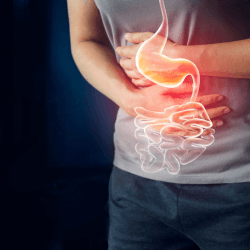Our Body’s Waste Disposal System!
Remember last month I said that we are what we eat, what we assimilate, and what we do not eliminate!
Our intestinal system has a huge job. Our modern lifestyle has lead us into creating some bad habits. Most of us eat more sugar and processed foods than we should and most of us tend to abuse our bodies with stimulants and sedatives. Our bodies are also over exposed to hundreds of toxins daily through the air we breathe, the water we drink, and the products we use. Normally our bodies are very effective in getting rid of toxins but with the hectic lifestyles we lead and the mounting stress we are under, most of us aren’t getting rid of those toxins effectively because our intestinal system is overloaded.
Our intestinal system (which is the lower part of our digestive tract) is responsible for reabsorbing water and electrolytes and eliminating cellular waste and digestive by-products. Sounds simple, but it really is one of the most important functions of the body.
The colon or large intestine consists of the following:
- Cecum which is located at the beginning of the ascending colon where the small intestine joins the large intestine.
- Ascending Colon is found on the right side of the body.
- Transverse Colon goes across the body.
- Descending Colon is found on the left side of the body.
- Sigmoid is where the colon is connected to the rectum.
- Rectum is the exit.
The cecum is where the water, fiber, and foods go that the body isn’t able to break down in the small intestine. This last part of the small intestine is known as the ileum and it is through the ileocecal valve that these waste products enter the cecum or the beginning of the large intestine or colon. Each time this valve opens, contents are pushed from the ileum into the cecum. The wastes then move to the ascending colon and begin their journey to the rectum. The colon or large intestine is capable of absorbing 90% of the water, sending it back into the bloodstream. The nerves and muscles of the colon regulate our transit time. The response our bodies have to stress can directly or indirectly affect the function of the gut through its unique system of nerves within the bowel wall.
Transit time is key.
Stress and lack of muscle tone can seriously disturb the function of our colon. If waste remains in the colon too long, too much water is absorbed and the waste remains leading to constipation. Constipation leads the way to an accumulation of toxins that build in the intestines which can later lead to the lymphatic system and our bloodstream. The longer the transmit time, the longer the toxic waste sits there, putrefies and gives the potential to be reabsorbed. If this putrefication process continues it can actually lead to a condition known as autointoxification. The longer we expose our bodies to putrefied food in our intestines, the greater the risk we have of developing this condition. Slow transit time can be caused by a variety of factors such as stress medication, poor dietary habits, inadequate fiber, dehydration and lack of exercise.
If your transit time is too quick, the fluids aren’t sufficiently reabsorbed and this can cause too much liquid which results in diarrhea. Diarrhea can be casued by a variety of factors such as viruses, antibiotic medications, harmful bacteria, parasites, emotional stress, and inflammatory bowel disorders.
The Main Problem of the Intestinal System

Colon Polyps and Cancer
Polyps are an abnormal growth of tissue in the colon and are a major concern for many of us. Take a look at some of the following statistics.
- 95% of colorectal cancers develop from polyps.
- More than 130,000 new cases of colorectal cancers are diagnosed in the US each year.
- The National Cancer Institute states that colorectal cancer is the 3rd occurrence and cause of cancer deaths.
- Over 50,000 people in the US die annually as a result of colorectal cancer.
Risk factors for colorectal cancer include alcohol and tobacco use, a sedentary lifestyle, eating a diet rich in detrimental fats and low in fiber. Research studies show that the composition of a diet does influence the diversity of the microbes in the gut and provides the link between diet and colonic disease and colon cancer.
Some conditions related to an unhealthy colon:
- Hemorrhoids
- Leaky Gut
- Diverticulitis
- Constipation / Diarrhea
- Polyps
- Cancer
- Ulcerative Colitis
- Irritable Bowel Syndrome
- Crohn’s Disease
Eating a diet too high in red meat, cheese, refined breads and cereal, fried foods, and foods high in sugar and salt can rob your body of critical electrolytes and lack the fiber needed for proper digestion. A healthy diet rich in vegetables, fruits, whole grains and dietary fiber along with exercise can improve your ability to move food through your digestive system completely and easily.
Things We Can Do – Keep your Intestinal System Healthy
- Increase your fiber intake. Some researchers say 35 grams per day are needed and make sure you are getting your fiber from soluble and insoluble sources
- Water is the best tool for cleansing. Makes sure you drink a 1/2 ounce per lb of body weight per day. If you are doing a colon cleanse you need to drink more water. A 200 lb individual should drink 100 oz of water per day.
- Chew your food. Undigested meat and other foods cause a mucus buildup in the colon which produces toxins that can enter the bloodstream.
- Take time to have a bowel movement. Do not resist the urge to go to the bathroom. This can cause waste material to build up and become compacted leading to constipation.
- Travel. When traveling make sure you take measure to make sure you do not become constipated. Use a natural stool softener f if you have to.
- My favorite product for rebuilding health throughout the intestinal tract, especially if you have one of the conidtions above is Intestinal Soothe and Build you may have to take it awhile, however it has helped many! You should also read our Digestive System Newsletter for more helpful information, tips and supplements.
